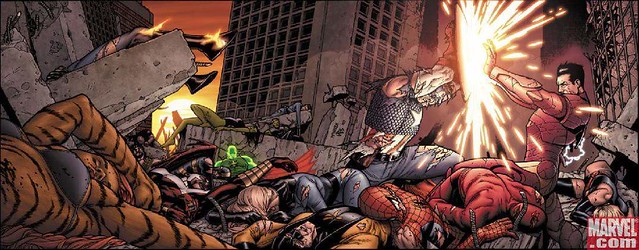
A few young heroes botch a mission so bad that 600 civilian lives were lost in collateral damage. The city mourns, the victims angered, and the superhero community is shaken to the core. This tragic event sparks a wave of controversy and public reflection: who do heroes answer to when they’re the ones who hurt the people?
Suddenly there’s precedent for the government wanting to take a little bit of control over our heroes. They pass the Superhero Registration Act – a law that requires vigilantes to enlist with the government and undergo training before being sanctioned to do superhero things. But not everyone agrees with the new ruling, and arguments escalate, sides are formed, and the stage is set for Marvel’s superhero Civil War.
Readers can attest that Civil War was a dense narrative especially when it came to its ethical and political opinions. It was as exciting and action-packed as it was thought-provoking, as it inspired its audience to think critically, form their own views and genuinely choose a side in the debate.
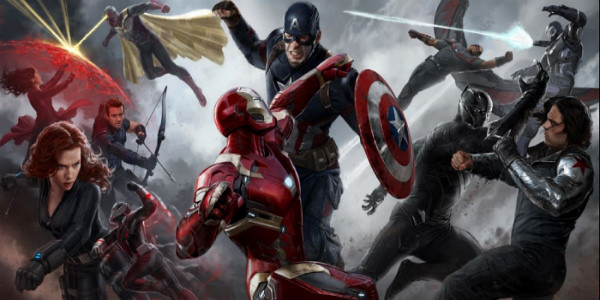
The live-action adaptation arrives in a week!
But with the immense dialogue and individual perspectives collected in the comic book event, a two-hour movie may not be long enough to capture its complexities. So as a supplement to next week’s most anticipated Marvel film, let me give you a quick rundown of the arguments and principles driving both sides of Marvel’s Civil War (comic!)
Accountability vs Philosophical Freedom
TEAM IRON MAN
Who do heroes answer to when they make mistakes or accidentally hurt civilians? Who tells them when they’ve gone overboard? Who controls the champions of justice when they’re the ones doing the injustice?
The theme of accountability is what’s heavily examined in the conflict. As one parent put it – kids (and adults) can’t just run around doing anything they want just because they’re in costume. Every hero needs to be liable for their actions, mistakes and all, and they need to answer to a higher body – a body created by the people.
The public distrust for heroes grew to the point of violence against the superhero community. They demanded some sort of repercussion and Tony saw the superhero registration act as the best compromise to pacify an angered public. It was time to let go of the old ways and embrace the inevitable progression of their vigilante lifestyle.
TEAM CAP
On the other hand, Captain America believes in autonomy and moral freedom. To enlist is to become government tools, weapons that they can point at something or someone. The government may have been created by the people, but it’s still made up of men, with their own agendas, and is similarly imperfect. Registration would only force heroes to fight wars that weren’t their own, wars that aren’t necessarily right, but politically right. And to Cap, superheroes need to intrinsically be above all that.
Cap believes wholeheartedly that heroes can and should decide for themselves what’s right from wrong. Part of the reason why they became heroes in the first place was to fight battles the government weren’t willing to fight, or couldn’t, or right the wrongs the government themselves perpetrate.
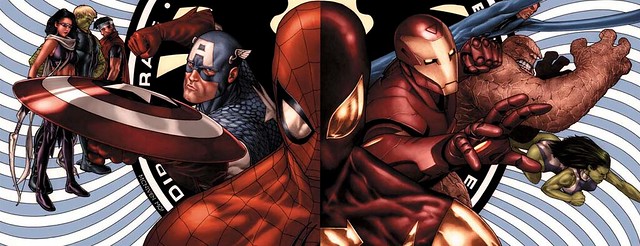
In the comics, Spider-man acted as sort of the story's moral compass and audience's avatar.
They probably wont do that in the movies though.
Public Safety vs Heroes' Safety
TEAM IRON MAN
Without anyone to answer to, without supervision, criticism, limitations, or guidance, these superheroes – most of whom have city-leveling abilities – can run amok, abuse their status, or make weighty mistakes; mistakes that could potential cost dozens, if not hundreds of lives.
Careful monitoring, deeper study of their abilities, training and protocol – this would all help keep both civilians and the heroes themselves safer, especially when it concerns the younger, less experienced superheroes. The price is just too high not to take precaution.
TEAM CAP
Cap on the other hand worries about the dozens of villains finding out heroes’ real names. Not all of them have secret identities, but the ones who do, hide them for a reason. Their enemies could come after them at their home or at work, or worse, come after and hurt the ones they love!
Even though the government assures the security of such sensitive information, it would only be a matter of time before that list got out, and when it does, hero and civilian lives would be in dire jeopardy and Cap will absolutely not risk that.
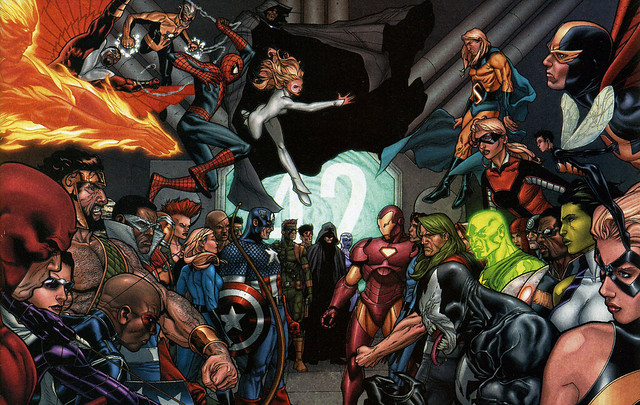
Here's to give you an idea of just how massive the comic book Civil War got.
Efficient Justice vs Upholding Civil Rights and fundamental decency
TEAM IRON MAN
Due to the volatile and diverse nature of super-powered beings they have to apprehend, Iron Man and his team become increasingly authoritarian and hard-hearted, keeping prisoners in a prison on an alternate dimension, sometimes without due process and even enlisting the aid of the Thunderbolts (a supergroup made up of criminals).
But when you’re arresting individuals with a wide-range of destructive and unpredictable abilities, you have to be swift and decisive. Tony argues that his methods are for efficiency’s sake and that the faster they get these types of criminals off the streets the safer the rest of the world will be.
TEAM CAP
Iron Man may be getting criminals off the streets, but at what price? Without due process, suddenly Tony is judge and jury. Tony’s so called efficiency is just another way to call cutting corners, cheating the system, trampling on civil liberties. And when Tony’s increasingly brutal ways led to the death of one of their own, it became clear that Tony was stepping over a line. Is using excessive force what law enforcement has come to?
There is just something fundamentally wrong about the idea of treating people who risk their lives for strangers every week as criminals, something fundamentally wrong about using brute force on friends, something fundamentally wrong about arresting them even as they continue to do nothing but good. Cap, and those who follow him, will not ever compromise these core values.
Other Arguments
TEAM IRON MAN
Financial Security
They’re going to risk their lives for the public either way, so why not get compensated doing it? Enlisting would give street-level heroes like Spidey a chance to make a living while doing something they'd have done for free regardless. It’s not the most noble of arguments, but hey, it’s reality. Superheroes got bills to pay too!
***
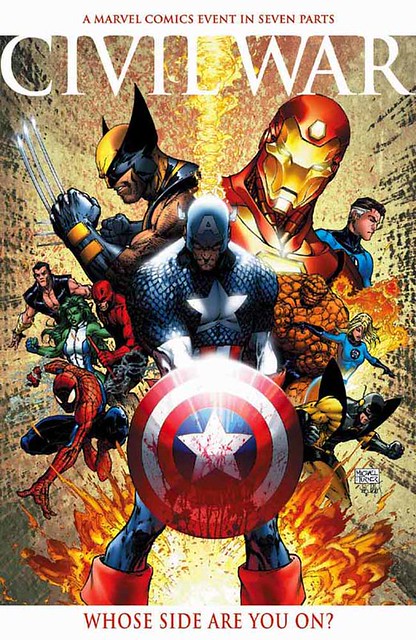
The comic universe and the cinematic universe are 2 distinct entities altogether, but the main issues will still likely remain: Freedom vs Security – just how much freedom are the heroes willing to give up for the sake of security? What really is better for the people – a controlled hero community or one that’s not tied down to the government’s politics?
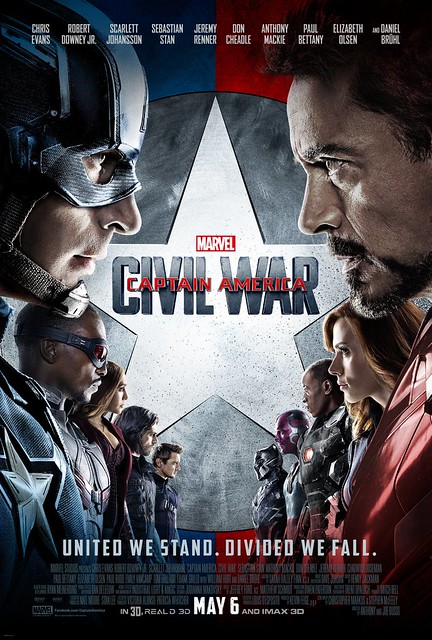
Captain America: Civil War is in cinemas April 27!
What do you think? Are you Team Iron Man or Team Captain America? One week left ‘til Captain America: Civil War, it’s time to choose a side!
*First seen on The Philippine Online Chronicles!
*First seen on The Philippine Online Chronicles!

No comments:
Post a Comment